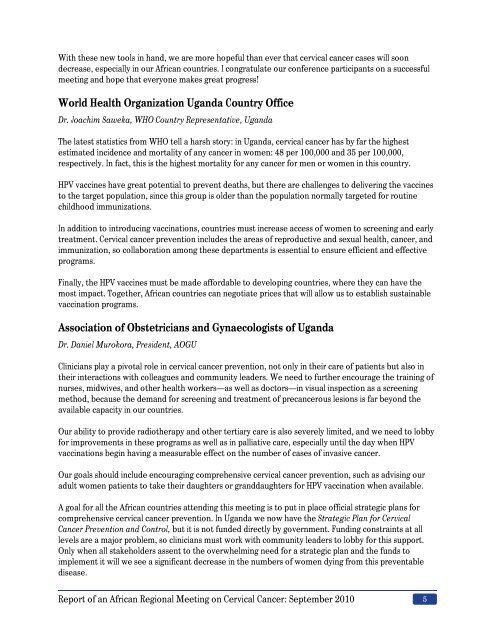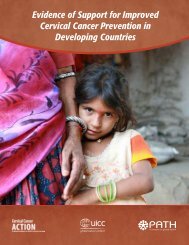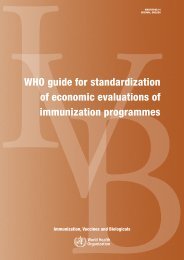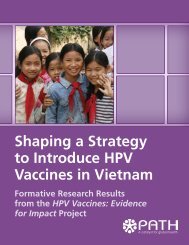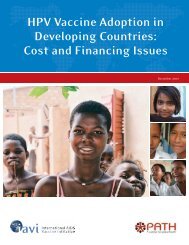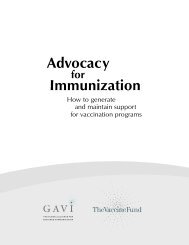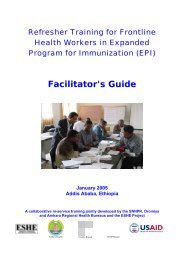Download file, English (1 MB PDF) - RHO
Download file, English (1 MB PDF) - RHO
Download file, English (1 MB PDF) - RHO
You also want an ePaper? Increase the reach of your titles
YUMPU automatically turns print PDFs into web optimized ePapers that Google loves.
With these new tools in hand, we are more hopeful than ever that cervical cancer cases will soon<br />
decrease, especially in our African countries. I congratulate our conference participants on a successful<br />
meeting and hope that everyone makes great progress!<br />
World Health Organization Uganda Country Office<br />
Dr. Joachim Saweka, WHO Country Representative, Uganda<br />
The latest statistics from WHO tell a harsh story: in Uganda, cervical cancer has by far the highest<br />
estimated incidence and mortality of any cancer in women: 48 per 100,000 and 35 per 100,000,<br />
respectively. In fact, this is the highest mortality for any cancer for men or women in this country.<br />
HPV vaccines have great potential to prevent deaths, but there are challenges to delivering the vaccines<br />
to the target population, since this group is older than the population normally targeted for routine<br />
childhood immunizations.<br />
In addition to introducing vaccinations, countries must increase access of women to screening and early<br />
treatment. Cervical cancer prevention includes the areas of reproductive and sexual health, cancer, and<br />
immunization, so collaboration among these departments is essential to ensure efficient and effective<br />
programs.<br />
Finally, the HPV vaccines must be made affordable to developing countries, where they can have the<br />
most impact. Together, African countries can negotiate prices that will allow us to establish sustainable<br />
vaccination programs.<br />
Association of Obstetricians and Gynaecologists of Uganda<br />
Dr. Daniel Murokora, President, AOGU<br />
Clinicians play a pivotal role in cervical cancer prevention, not only in their care of patients but also in<br />
their interactions with colleagues and community leaders. We need to further encourage the training of<br />
nurses, midwives, and other health workers—as well as doctors—in visual inspection as a screening<br />
method, because the demand for screening and treatment of precancerous lesions is far beyond the<br />
available capacity in our countries.<br />
Our ability to provide radiotherapy and other tertiary care is also severely limited, and we need to lobby<br />
for improvements in these programs as well as in palliative care, especially until the day when HPV<br />
vaccinations begin having a measurable effect on the number of cases of invasive cancer.<br />
Our goals should include encouraging comprehensive cervical cancer prevention, such as advising our<br />
adult women patients to take their daughters or granddaughters for HPV vaccination when available.<br />
A goal for all the African countries attending this meeting is to put in place official strategic plans for<br />
comprehensive cervical cancer prevention. In Uganda we now have the Strategic Plan for Cervical<br />
Cancer Prevention and Control, but it is not funded directly by government. Funding constraints at all<br />
levels are a major problem, so clinicians must work with community leaders to lobby for this support.<br />
Only when all stakeholders assent to the overwhelming need for a strategic plan and the funds to<br />
implement it will we see a significant decrease in the numbers of women dying from this preventable<br />
disease.<br />
Report of an African Regional Meeting on Cervical Cancer: September 2010 5


